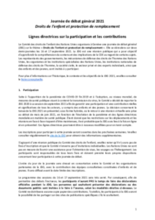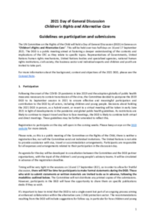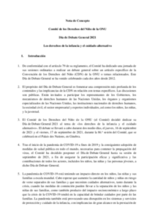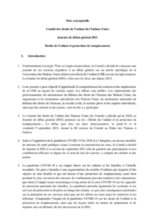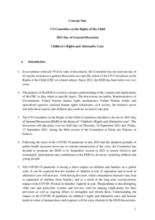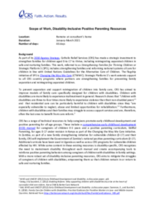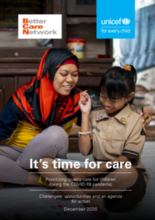Displaying 1161 - 1170 of 4424
Le Comité des droits de l’enfant des Nations Unies organisera à Genève une journée de débat général (JDG) sur le thème « Droits de l’enfant et protection de remplacement ». Les représentants des gouvernements, les mécanismes de défense des droits de l’homme des Nations Unies, les organismes et les institutions spécialisées des Nations Unies, les institutions nationales de défense des droits de l’homme, la société civile, le secteur privé et des experts individuels, ainsi que des enfants et des jeunes, sont invités à y participer.
As part of a public consultation to help feed into and guide the discussions at the 2021 Day of General Discussion, all interested stakeholders, whether adults or children, are encouraged to send written submissions to the Committee. This document includes guidelines for participation submission.
Esta nota de concepto incluye información sobre el contexto, importancia, propósito, alcance, y objetivos claves del Día de Debate General 2021 al tema de «los derechos de la infancia y el cuidado alternativo».
Le Comité des droits de l’enfant des Nations Unies (le Comité) a décidé qu’en 2020, sa Journée de débat général (JDG) porterait sur les « Droits de l’enfant et la protection de remplacement ».
This concept note outlines the context, background, relevance, purpose, scope, and objectives of the 2021 Day of General Discussion on the theme of “Children’s Rights and Alternative care”.
CRS requests a consultant or team of consultants to review positive parenting resources being used by CRS and adapt or improve them for caregivers of children with disabilities.
Housed under the Research Center, the Research Affiliates Program engages academic researchers who want to see their work make a bigger impact for vulnerable children and families.
In an effort to highlight what is working, improve care for vulnerable children, and catalyze more relevant research for care leavers, this study will survey care leavers from alternative care settings across multiple nations.
In the present report, submitted pursuant to General Assembly resolution 74/133, the Special Representative of the Secretary-General on Violence against Children, Najat Maalla M’jid, provides an overview of major initiatives and developments that sustain and scale up efforts to safeguard children’s freedom from violence and advance implementation of the 2030 Agenda for Sustainable Development.
This new discussion paper produced by UNICEF and Better Care Network elaborates on the extraordinary challenges facing children and families across the globe, and the steps that can be taken to ensure their inclusion in COVID-19 recovery plans.

